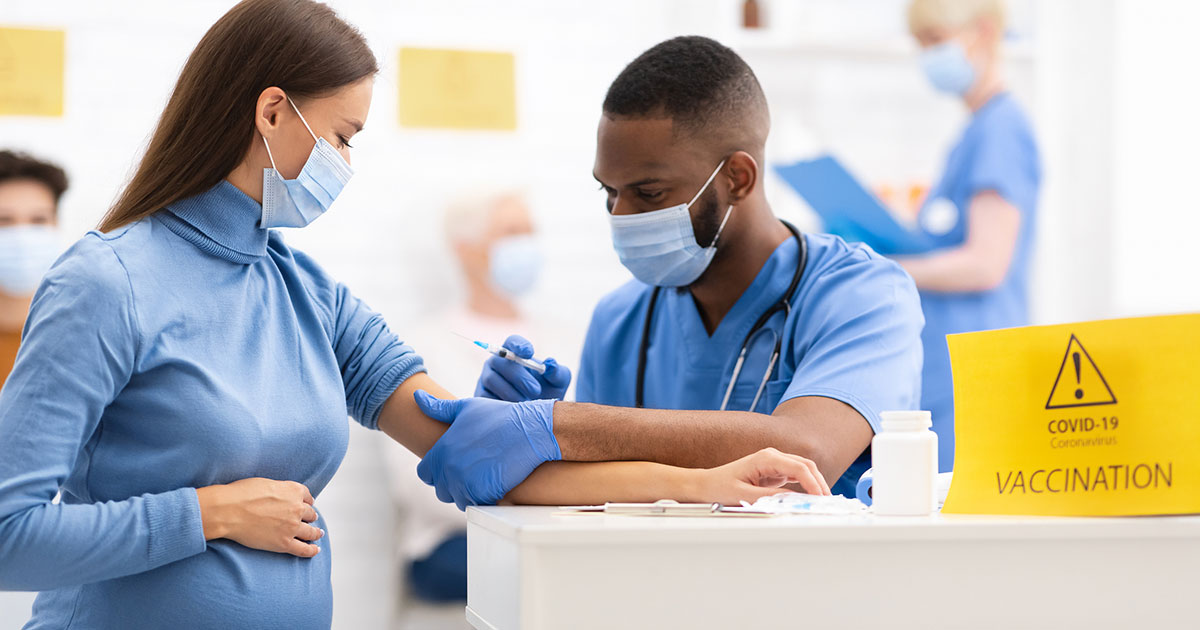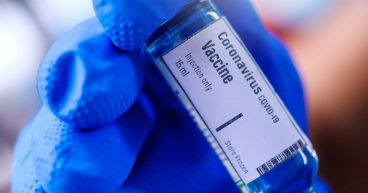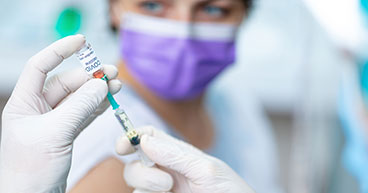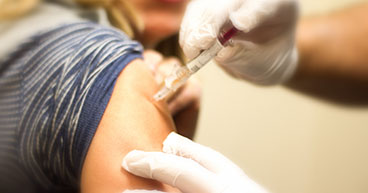
The much-anticipated rollouts of the first COVID-19 vaccines were greeted with applause and fanfare. Nurses, public officials and senior citizens in the United Kingdom and the United States were televised live getting injections, making history for being among the first recipients of the approved vaccine. The images offered some hope and relief that the long, difficult pandemic may be waning.
But it will be many months before the vaccines are distributed to enough Americans to put the pandemic behind us. In the meantime, as cancer patients wait to be among those approved to begin getting the vaccine, many have questions specific to how safe and effective the COVID-19 vaccines will be for them. Here are some answers:
Are the COVID-19 vaccines safe for cancer patients?
It is important for cancer patients have the approval of their oncologist before getting any vaccine, including one for COVID-19. In general, however, both the COVID-19 vaccines currently available and the flu shot are strongly encouraged for cancer patients.
In general, most vaccines are safe for cancer patients, and it’s important for patients and their caregivers to stay current on all their vaccines. Vaccines help prevent serious diseases, including measles and the flu. Cancer patients may experience severe symptoms from those illnesses if they end up contracting them.
Clinical trials for the new vaccines did not include cancer patients. However, since the vaccines are made with messenger ribonucleic acid (mRNA) and not a live virus, the shots may actually be better suited for cancer patients, some of whom may not be able to receive virus-based vaccines. Markman, MD, President of Medicine & Science at Cancer Treatment Centers of America® (CTCA), says patients “should not be discouraged by possible side effects, as the benefits of vaccination far exceed any potential, limited short-term risks.”
Which COVID-19 vaccine works best for cancer patients?
Two vaccines—Pfizer’s BNT162b2 and Moderna’s mRNA-1273—have been approved and are being distributed. Another—AstraZeneca’s AZD1222—is expected to be approved for use soon. Several more are advancing through clinical trials.
The Pfizer and Moderna versions are nontraditional vaccines because they use messenger ribonucleic acid (mRNA) to send instructions to immune cells to target the coronavirus’ spike proteins, which give COVID-19 cells their crown-like appearance. Spike proteins allow the virus to penetrate and infect healthy cells, helping the virus to spread.
“Both are equally effective,” says Mashiul Chowdhury, MD, Infectious Disease Program Specialist at CTCA®.
The Pfizer and Moderna vaccines require two injections several weeks apart. Dr. Chowdhury says that even though both vaccines work on the same principle, “be careful not to mix and match. If you get the Pfizer vaccine, stay with the Pfizer vaccine. Do not switch to the other for your second dose.”
The AstraZeneca vaccine is more traditional. Like most vaccines, it uses a an attenuated, or weakened, version of a coronavirus—one that may normally cause a common cold—to train the immune system to recognize the COVID-19 virus. This vaccine should also be safe for cancer patients, but check with your doctor first.
Should I wait to get a COVID-19 vaccine if I am on or just completed cancer treatment?
It may depend on your type of cancer and/or your type of treatment.
Cancer patients who are on immunosuppressant therapy, such as those used before stem cell transplants, may not be good candidates for the vaccines. Consult with your oncologist about the appropriate time for you to receive your COVID-19 vaccine or any other vaccine.
Do the COVID-19 vaccines have side effects?
Most vaccines have side effects, which often are a sign that they have triggered an immune response and are working. Vaccine side effects vary from person to person, depending on the type of vaccine. Most people have little or no reaction to a vaccine injection. Patients should be observed for up to 30 minutes after receiving the vaccine for anaphylactic reactions.
According to U.S. Centers for Disease Control and Prevention (CDC), side effects from the COVID-19 vaccine may “affect your ability to do daily activities.” For that reason, expect side effects and plan your day accordingly.
Common reported side effects from COVID-19 vaccines include:
- Pain or swelling at the injection site
- Fatigue
- Fever
- Headache
- Chills
Side effects may appear after the first of the two required injections. Even so, patients should plan on getting their second injection unless their physician recommends otherwise. Some of these side effects may be more pronounced in cancer patients who are also experiencing side effects from their disease or treatments. Contact your care team immediately, or call 911, if you have serious side effects.
Can COVID-19 or the vaccines increase my cancer risk?
Some viruses may create conditions in the body that increase your risk of developing cancer. The human papillomavirus (HPV), for example, is known to cause most cervical cancers and has been linked to anal, throat and vaginal cancers. The hepatitis C virus and human immunodeficiency virus (HIV) also increase the risk of certain cancers.
Coronaviruses are very common, and some cause common colds. There is no evidence that the coronavirus that causes the COVID-19 infection or the vaccines increase cancer risk.
Are COVID-19 vaccines safe for me if I’m pregnant?
Little scientific data exists on the effects of the current COVID-19 vaccines on pregnant or lactating women or their fetuses or babies. And the effects of mRNA vaccines on pregnant women have not been studied.
However, the CDC says that because the vaccines are based on mRNA, there should be little risk to pregnant women who do not have other underlying conditions, such as cancer, autoimmune disease or vaccine allergies. The CDC also stresses the dangers of pregnant women getting infected with COVID-19, saying the illness may result in “adverse pregnancy outcomes, such as preterm births.”
The American College of Obstetrics and Gynecology (ACOG) recommends that the vaccines be made available to pregnant and lactating women and that “patients who decline vaccination should be supported in their decision.”
The CDC and ACOG encourage pregnant women to make informed decisions after discussing options with their doctor. Research on potential vaccine side effects in children and pregnant women is ongoing.
I have allergies. Should I be concerned about taking this vaccine?
While there are reports of allergic reactions to the COVID-19 vaccines they are uncommon, and the vast majority have been mild. A hospital worker in Alaska had an allergic reaction 10 minutes after being injected and eventually needed to be hospitalized. Some health care workers in England were among the earliest to have allergic reactions.
Anaphylaxis happens at a rate of about one per million doses, according to the CDC. Before getting a COVID-19 vaccine, tell your doctor about your history of allergies and if you’ve had allergic reactions to previous vaccines or a history of anaphylaxis.
Should my caregivers and family, including my young children, get the COVID-19 vaccine?
Cancer patients should be sure that their caregivers, family members and anyone who comes into close contact with them are aware of the importance of vaccines and other ways to prevent the spread of disease.
But the vaccine may not be available to them for several months. Currently, health care workers, nursing home residents, senior citizens and those deemed “essential workers” will get the vaccines first. Those considered to have a lower risk of infection and transmission, including young adults and children, may need to wait even longer for their vaccines. Also, prioritization for the vaccine varies from state to state.
Still, cancer patients should urge their caregivers and family members to talk to their doctors about getting the COVID-19 vaccine as soon as it’s available to them.
Does getting the vaccine mean I don’t have to wear a mask or socially distance?
No. The vaccines are proven to be highly effective in preventing infection from the virus, but much is unknown about how the vaccine may prevent the spread of the virus from one person to another. We don’t know, for example:
- How long the vaccine takes to create immunity
- How long the immunity lasts
- Whether a vaccinated person is still able to transmit the virus
And while the vaccine is said to be 95 percent effective, what if you’re among the 5 percent for which it doesn’t work?
It’s important for cancer patients to take extra steps to avoid infections. Symptoms of infections, such as a low-grade fever or fatigue, that are minor for most people may turn into serious conditions for those with cancer. Even if you get a COVID-19 vaccine, it’s important to practice social distancing, avoid crowds, wash your hands frequently and wear a mask.
Have more questions about COVID-19 and cancer? Click here to chat with an expert.



